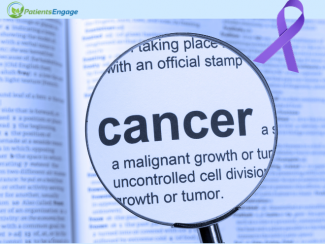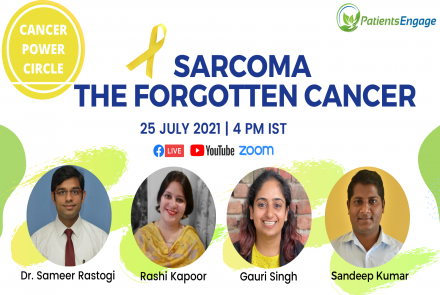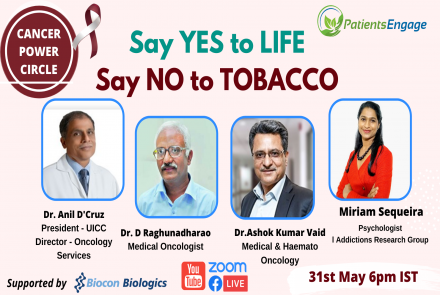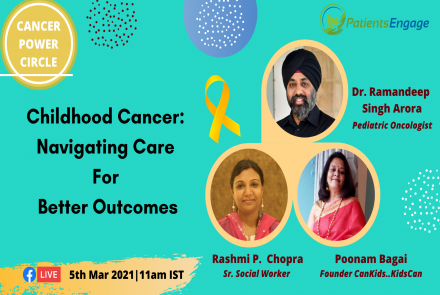
When a patient is diagnosed with cancer, they and their family caregivers need to suddenly learn a new vocabulary of terms. It can be overwhelming to look at various reports and make sense of what it means. PatientsEngage has put together a glossary of various cancer related terms. Bookmark this for easy reference.
If you don't find the term you are looking for leave a comment below or send us a note through contact us and we will update the content.
Adenocarcinoma
Cancer that starts in the glandular or secretory cells such as those that line internal organs and produce mucous, digestive juices etc. Most cancers of the lung, pancreas, breast, colon and prostate are adenocarcinomas.
Adjuvant therapy
Additional treatment given after the primary treatment is over is called Adjuvant. It is meant to increase the chances of cure and lower risk of the cancer returning. It may include chemotherapy, radiation, hormonal or biological therapy. Read more about adjuvant chemotherapy here.
Axillary lymph nodes
Lymph nodes found in the armpit area are called axillary.
Benign
Benign or non-malignant means not cancer causing. Tumors that are benign do not spread to other parts of the body and may often not require any treatment. They should be checked on regularly as they may grow.
Bilateral cancer
Cancer that occurs in both paired organs such as ovaries, breasts, lung, kidneys, eyes etc.
Biopsy
When tissue cells are removed for examination under a microscope by a Pathologist, it’s called a Biopsy. Incisional or Core Biopsy is when only one sample is removed. Excisional biopsy is when an entire lump is removed. Needle biopsy or fine-needle aspiration is when fluid or tissue is removed with a needle.
Bone marrow suppression
When the bone marrow is not making enough blood cells, possibly due to cancer or side-effect of cancer therapy.
Bone marrow transplant
A procedure that replaces the bone marrow or stem cells that may have been destroyed by disease or cancer treatment. If transplant is from the patient’s own marrow, it’s autologous, if it’s from a donated marrow, it’s allogenic and if donated by an identical twin, it’s syngeneic.
Brachytherapy
Radiation administered directly into the cancer-affected areas via wires or implants. Is commonly used for breast, prostate and cervical cancers.
Cancer Free
Is a term used when not only is there no cancer detected in the body but one also believes that all cancer cells have been destroyed and the cancer will not come back. It can sometimes be confused with No Evidence of Disease or Remission which are more commonly used terms.
Carcinogen
Any substance that has the potential to cause cancer. Known carcinogens include ionizing radiation, chemicals in cigarette smoke, industrial solvents, asbestos etc.
Carcinoma
A cancer that arises from the epithelial cells that line internal or external organs.
Chimeric antigen receptor (CAR) T-cell therapy
A type of immunotherapy in which a person’s own T cells are altered to fight and kill cancer cells. T cells are taken from the patient's blood and in a laboratory, genes for the chimeric antigen receptor or CAR are added. This helps the T cells attach to specific cancer cell antigens and destroy them. CAR is specific to a cancer antigen because different cancers have different antigens.
Chemotherapy
Medicines used for treatment of cancer, and certain infectious diseases. Given through IV, orally or via a port. Read more about the role of chemotherapy here.
Learn how to manage Chemotherapy side effects here
Clinical trial
Research studies which experiment with whether a treatment plan, new drug, diet or device is effective. Patients willing to try an experimental treatment can sign up for such trials.
Debulking surgery
Also known as cytoreduction is a surgery done to remove as much of the tumor as possible. This type of surgery is done in advanced cases where the tumor is too close to vital organs. The procedure helps reduce the tumor and prolong life. It is often followed by chemo and radiation therapy. Commonly done in ovarian cancer.
Excision
Removal of a part of tissue, organ or tumor from the body.
FISH (Fluorescence in situ hybridization)
This is a type of laboratory test used to detect where a specific gene is located on a chromosome. Helps diagnose cancer types and plan treatment.
Grade of tumor
Described how abnormal the tumor cells are from the normal cells. It provides an insight into how the cancer may behave and progress. A low grade cancer will grow slowly and is less likely to spread than a high grade cancer. Different cancers have their own grading system.
Graft-versus-host disease (GvHD)
This is a common complication that occurs after a stem cell or bone marrow transplant where the body or ‘host’ rejects the transplanted or donated cells or “graft”. Stem cell transplants are treatment options for people with blood cancers.
G-CSF (Granulocyte colony stimulating factor)
A hormone that stimulates the bone marrow to produce more blood cells. Commonly given via injections to patients who develop leukopenia during cancer or treatment process.
Immunosuppression
Suppression of the immune system, which can occur due to cancer or as an adverse reaction to treatment.
Immunotherapy
Treatment of cancer by modifying the immune response. It is a type of Biological therapy that stimulates or suppresses the immune system to help fight cancer. Types of immunotherapy include monoclonal antibodies, cytokines, BCG, vaccines etc.
IMRT(Intensity-modulated radiation therapy)
An advanced type of radiotherapy which targets tumors with concentrated doses of radiation that conform to the exact size, shape and depth of the tumor. This allows high doses to only attack the tumor and not the surrounding areas. Is very effective in Head & Neck cancers so that the spinal cord and salivary glands are not affected.
Infusion
Administration of fluids or medications into the bloodstream over a period of time.
In situ
In its original place where it started. For example, cancer in situ means the tumor is confined to its site and has not spread.
Leukemia
A cancer that starts in the blood-forming tissue and makes abnormal blood cells.
Leukopenia
Reduction in the number of white blood cells, often seen as a side-effect of Chemotherapy or Radiation.
Liquid biopsy
This is simple and non-invasive alternative to surgical biopsies. A sample of blood is taken to test for signs of cancer and cancer cell DNA. Other bodily fluids, such as urine, saliva, pleural effusion, and cerebrospinal fluid can also be used for analysis.
Localized tumour
A tumor that is invasive but remains in the site where it originated from.
Lumpectomy
Surgical removal of the breast tumor and some surrounding tissue.
Lymph nodes
Numerous bean-shaped glands located along the body’s lymphatic system. They filter the lymph fluid and contain lymphocytes (white blood cells) to fight infections. Cancer cells travelling via the lymphatic system can get trapped in these nodes, causing swelling.
Lymphatic system
A network of vessels which drain the fluid called lymph from the tissues. It also transports white blood cells and includes the lymph nodes, spleen, thymus gland and the bone marrow. Cancer cells can use this network to travel and spread through the body.
Lymphedema
Swelling in the areas, that is drained by the lymph nodes. Seen post-surgery, when lymph nodes in an area have been removed. For instance, lymphedema in the arms is common post axillary lymph node dissection in Breast Cancer patients. Check out our article on Lymphedema management here.
Lymphoma
Cancer of the lymphatic system which develops from a type of white blood cell called lymphocyte.
Malignant
A tumor that invades surrounding tissues and can spread to other parts of the body.
Mastectomy
Surgical removal of a breast.
Metastasis
Cancer that has spread to a different part of the body from where it first started. Such cancer is called Metastatic or 4th stage cancer. For more information read https://www.patientsengage.com/conditions/what-metastasis
Molecular gene testing
Also known as tumor genetic profiling, genomic testing or molecular profiling. A sample from your tumour or blood is tested using next-generation DNA sequencing (NGS) to provide important details about your cancer. This allows for a more precise diagnosis, treatment plan with latest targeted and immunotherapies and likely prognosis.
Monoclonal antibody
A protein that can bind to specific cells. They are used to carry Chemo drugs, toxins or radiotherapy directly to the cancer cells, thus specifically targeting and killing them.
Neoadjuvant therapy
Treatment given before surgery to first shrink the tumor. It can include chemotherapy, radiation therapy or hormone therapy.
Neoplasm
An abnormal or excessive growth of cells that forms a tumor.
Neutropenia
A decrease in the number of neutrophils (<1500ml). Neutrophils are a type of white blood cell that help fight infections. Commonly caused by leukemia, radiation and chemotherapy.
Neutropenic fever
Fever of more than 38oC or 100.4oF lasting for an hour or a single temperature of more than 38.3oC or 101oF in a patient who has neutropenia. It is important to recognize such fever early so that antibiotic treatment can be started immediately, and severe infection is avoided.
Oncologist
A doctor who specializes in the treatment of cancer.
Palliative treatment
Treatment designed to alleviate pain, manage cancer symptoms and improve quality of life. It is not aimed at curing the cancer.
PET Scan (Position emission tomography)
A computerized scan that uses radioactive glucose to detect fast growing cancer cells in the body.
Pleural effusion
Build-up of fluid in the pleural spaces (space between the lungs and chest cavity). When cancer patients develop pleural effusion, it is a sign that the cancer has spread. Malignant pleural effusion should be treated immediately as it can be life-threatening.
Port-a-cath
A device paced under the skin, commonly the chest to draw blood, administer drugs , IV fluids or blood transfusions. The port is connected via a tube or catheter to a large vein. It is used in case of frequent blood transfusions, small or damaged veins, bleeding problems, home chemotherapy etc.
Primary tumor
The place where the tumor first started.
Precision Oncology
This is an emerging way to treat patients by making treatment choices based on the patient’s tumor make-up and genetic profile. Your Oncologist may ask for genomic or molecular testing for a personalized or precision approach for your treatment plan.
Prognosis
The likely course (progression) of the disease for the patient.
Prophylactic
Medicine given to prevent or protect against the disease or drug side-effects. For example, anti-emetic medicines are always given before administering chemotherapy to prevent nausea and vomiting.
Prosthesis
An artificial replacement made for any missing body part that may have been cut off during surgery such as breast, eye, arm, leg etc.
Radiation or Radiotherapy
Form of cancer treatment where high-radiation beams are used to damage or kill cancer cells. Is also used in thyroid treatment, certain blood disorders and benign growths.
Radiation masks/shells
A mask or shell is made before radiation therapy starts so that the affected cancer area remains still during each therapy session. Usually made of plastic or plaster.
Recurrence or Relapse
The return of cancer after treatment and a period of remission. It happens because some cancer cells got left behind even after treatment and go undetected in follow-up scans.
Regression
Improvement in cancer or shrinkage of growth.
Remission or No Evidence of Disease
When all signs of cancer have disappeared from follow-up scans and tests meaning that presently, no cancer is currently detectable in the body.
Sarcoma
Cancer that originates in the bone, cartilage or muscle.
Stage of tumor
Describes the size of the tumor and if it has spread.
Stoma
A surgical opening created from the inside to the outside of the body to remove a diseased organ and relive symptoms. The three main types of stoma are Colostomy (opening from the colon to a bag where solid feces can be collected), Ileostomy (opening from the small intestine to a bag where liquid feces can be collected) and Urostomy (opening from the urinary bladder to a bag where urine can be collected).
Survival rate
The percentage of people who survive a certain type of cancer for a specific amount of time after diagnosis or commencement of treatment is called the survival rate. It is often stated as a five-year survival rate.
Targeted therapy
It is a type of drug therapy that targets specific genes or proteins that help cancer cells grow and divide. It does not affect normal cells like chemotherapy and radiation and hence has fewer side-effects. Most targeted therapy drugs are oral pills that are either monoclonal antibodies, small-molecule inhibitors which can also be classified as hormone therapies or immunotherapies.
Total parenteral nutrition (TPN)
Feeding of nutritional formulae and high caloric fluids to the patient via IV or tube (nasal or gastric). Given to patients who should not or are unable to take feeds through the mouth.
Tumor marker
A biomarker that is elevated in the blood or urine by certain cancers. Different tumor markers are used to detect presence of cancer.
References:
The Bantam Medical Dictionary, 5th edition
Oxford Handbook of Clinical Medicine, 6th edition
National Cancer Institute, Dictionary of Cancer Terms
















